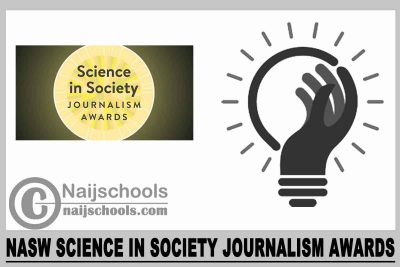This informs the public about the NASW Science in Society Journalism Awards 2024. Details about the Program are given below.

About NASW Science in Society Journalism Awards 2024
NASW established the Science in Society Journalism Awards to provide recognition for investigative or interpretive reporting about the sciences and their impact on modern society without subsidy from any professional or commercial interest.
Beginning with the first award in 1972, winners have demonstrated innovative reporting that goes well beyond the science itself and into ethical problems and social implications for communities and society. We primarily seek to recognize science writing shaped by various perspectives because such writing enables us to tell more broadly relevant stories that better serve our readers and communities. Therefore, we consider diversity in topics, sources, audience and authors to be a critical component of excellence. A committee of accomplished peers judges the entries each year.
Program Details
Beginning with the 2024 awards cycle, the Science in Society Journalism Awards will be open to submissions from international publications and outlets. English-language works first published or broadcast between January 1, 2023, and December 31, 2023, are eligible. Categories are platform-independent. Self-published works such as blogs are eligible for the awards; unpublished works are not.
-
Books: An entry consists of a book-length work published and made commercially available in print or as an e-book.
-
Commentary: An entry consists of a single article or broadcast that is an opinion piece, editorial, essay, or similar work that conveys a subjective perspective on a scientific issue of societal importance.
-
Science Reporting: An entry consists of a single article or broadcast covering recent or breaking news. Written entries must be fewer than 1500 words or a single broadcast, up to four minutes in length. If an entry consists of a combination of media (text + video, text + audio, etc.), each minute of audio/video is considered equivalent to 350 words. A mixed-media entry may not exceed the total word limit for the category. Entrants must indicate whether judges should consider text only or multiple media.
-
Science Features: An entry consists of a single article or broadcast that offers a deep dive into a subject. While the focus may be timely, the category is not intended for long-form breaking news. Features should be deeply reported and may include narrative elements, analyses and data visualizations. Written entries must be 1500-4000 words or a single broadcast, 4-12 minutes long. If an entry consists of a combination of media (text + video, text + audio, etc.), each minute of audio/video is considered equivalent to 350 words. A mixed-media entry may not exceed the total word limit for the category. Entrants must indicate whether judges should consider text only or multiple media.
-
Longform Narratives: An entry consists of a single article or broadcast that tells a compelling story through deep research and reporting and solid narrative storytelling. Written entries must be 4000 words or more, or a single broadcast, 12 minutes or more long. If an entry consists of a combination of media (text + video, text + audio, etc.), each minute of audio/video is considered equivalent to 350 words. A mixed-media entry may not exceed the total word limit for the category. Entrants must indicate whether judges should consider text only or multiple media.
- Series: An entry consists of articles or broadcasts published/produced as a coherent, named series in a single publication (or publications working together on the series). Entrants may submit at least two articles or broadcasts to represent the series and no more than three for consideration in the competition. If an entry consists of a combination of media (text + video, text + audio, etc.), each minute of audio/video is considered equivalent to 350 words. A mixed-media entry may not exceed the total word limit for the category. Entrants must indicate whether judges should consider text only or multiple media.
Prizes
NASW will award separate cash prizes of $2,000 for writing judged best in each category. The awards will recognize only authors or producers listed on the original submission. The awards will be announced in October 2024. In cases of multiple authors or producers, prize money will be split between the entrants at their discretion. However, the prize money is intended for content authors or producers, not publications or news organizations.
Application
For those interested in the NASW Science in Society Journalism Awards 2024. Open this link to start the application process.
Application Deadline
- The deadline for receipt of applications is 1 February 2024.
Open this link for more details about NASW Science in Society Journalism Awards 2024.
Check Out:
- Sigma Awards 2024 for Data Journalism ($5,000 cash prize)
- Action for Nature International Young Eco-Hero Awards 2024
- Foodtech Innovation Awards 2024
